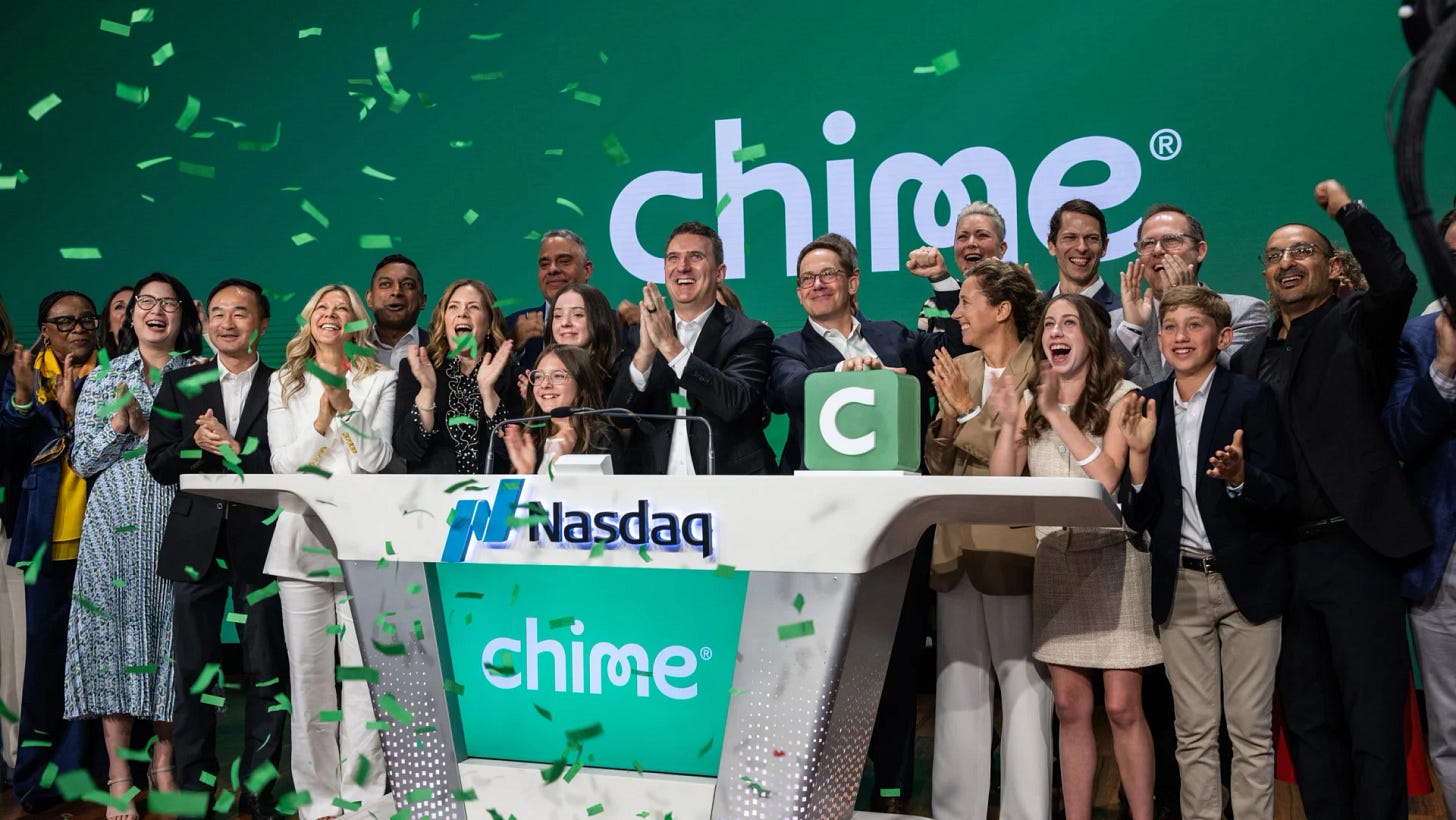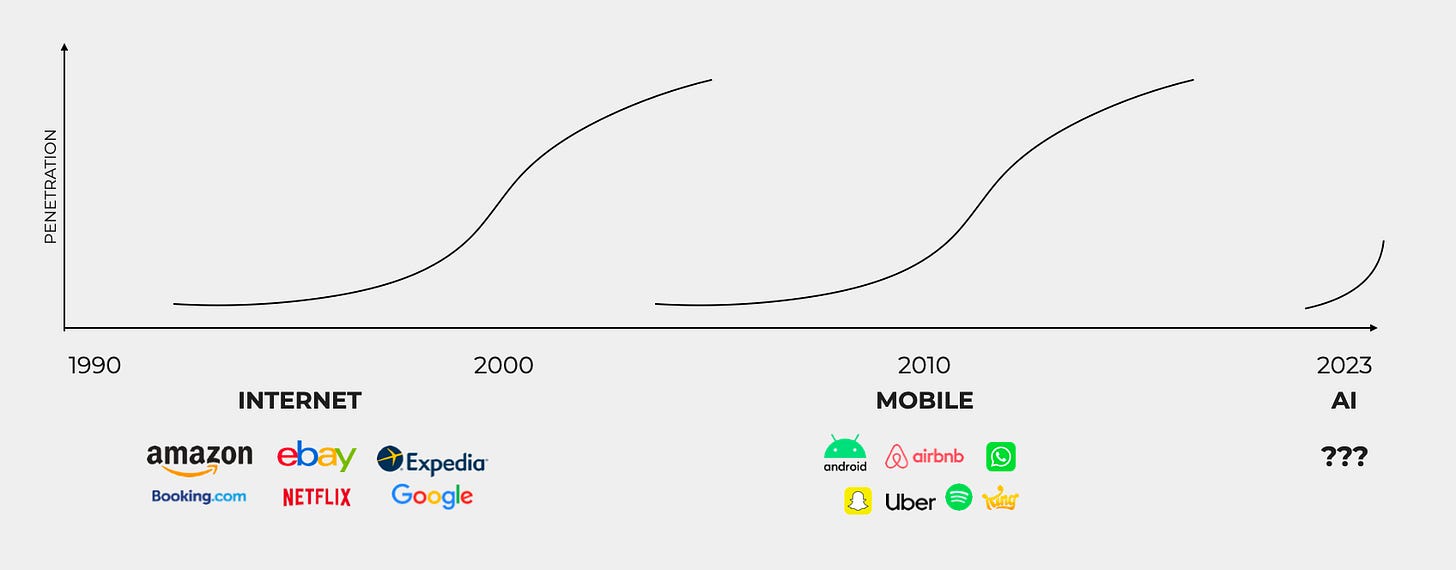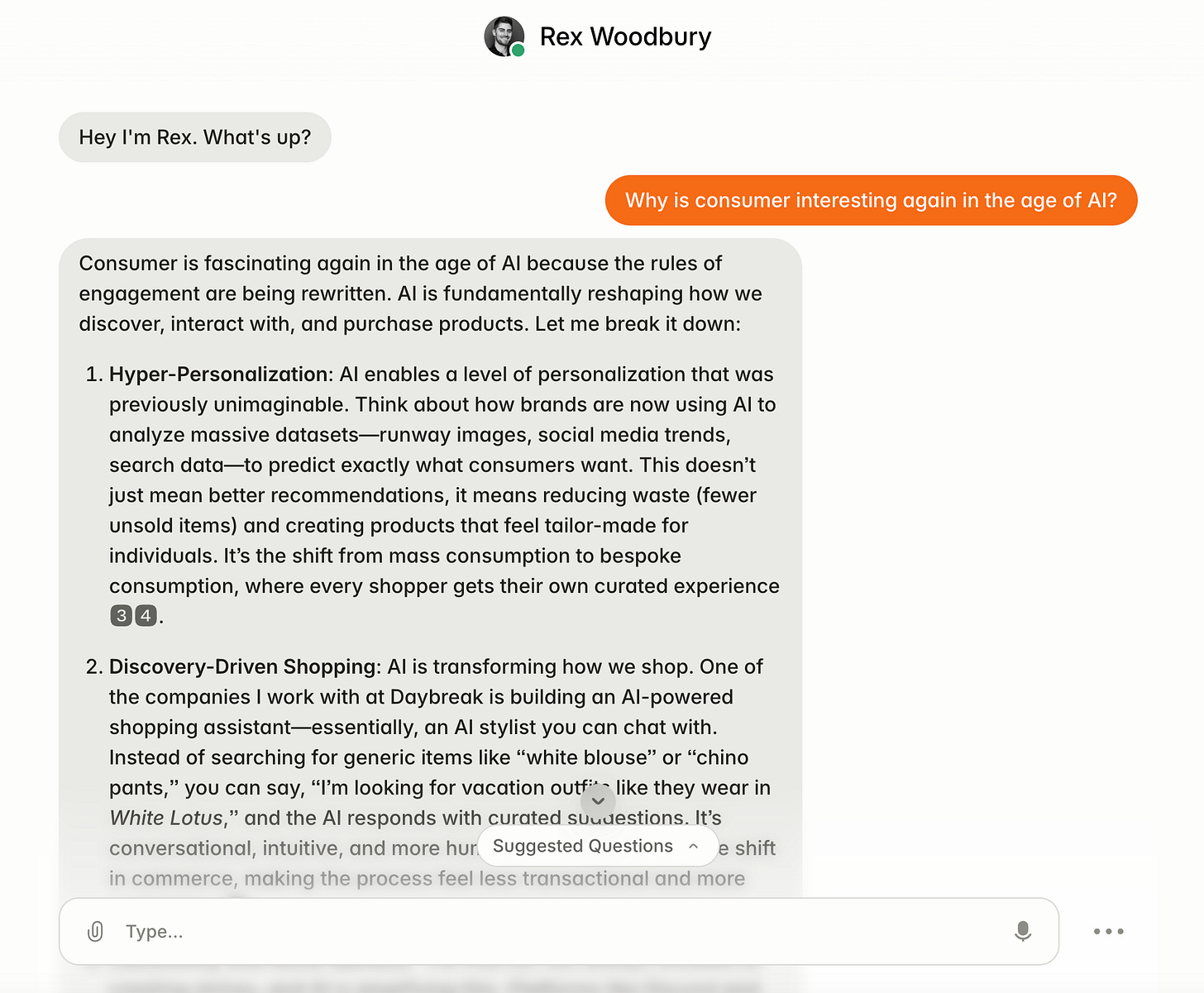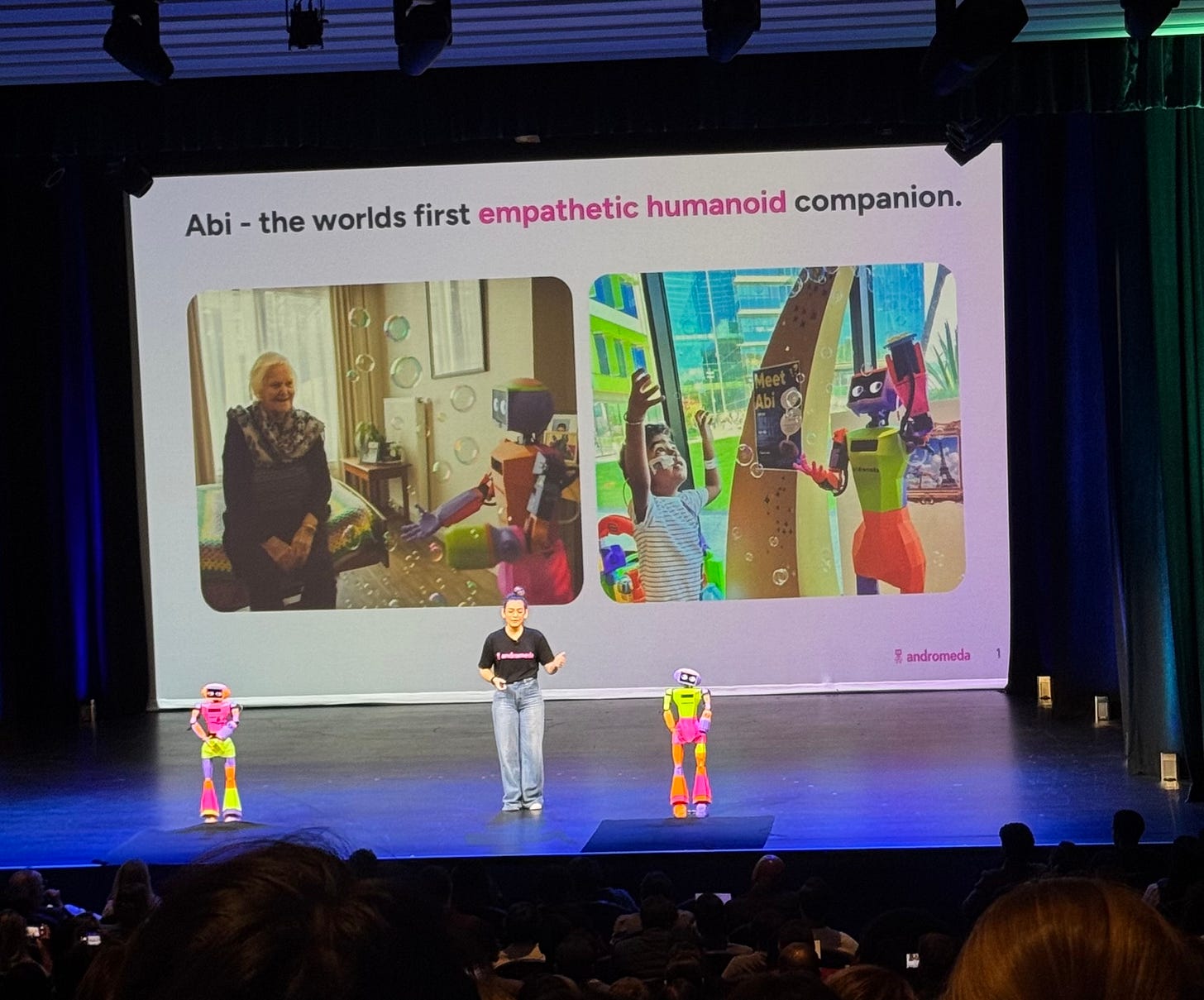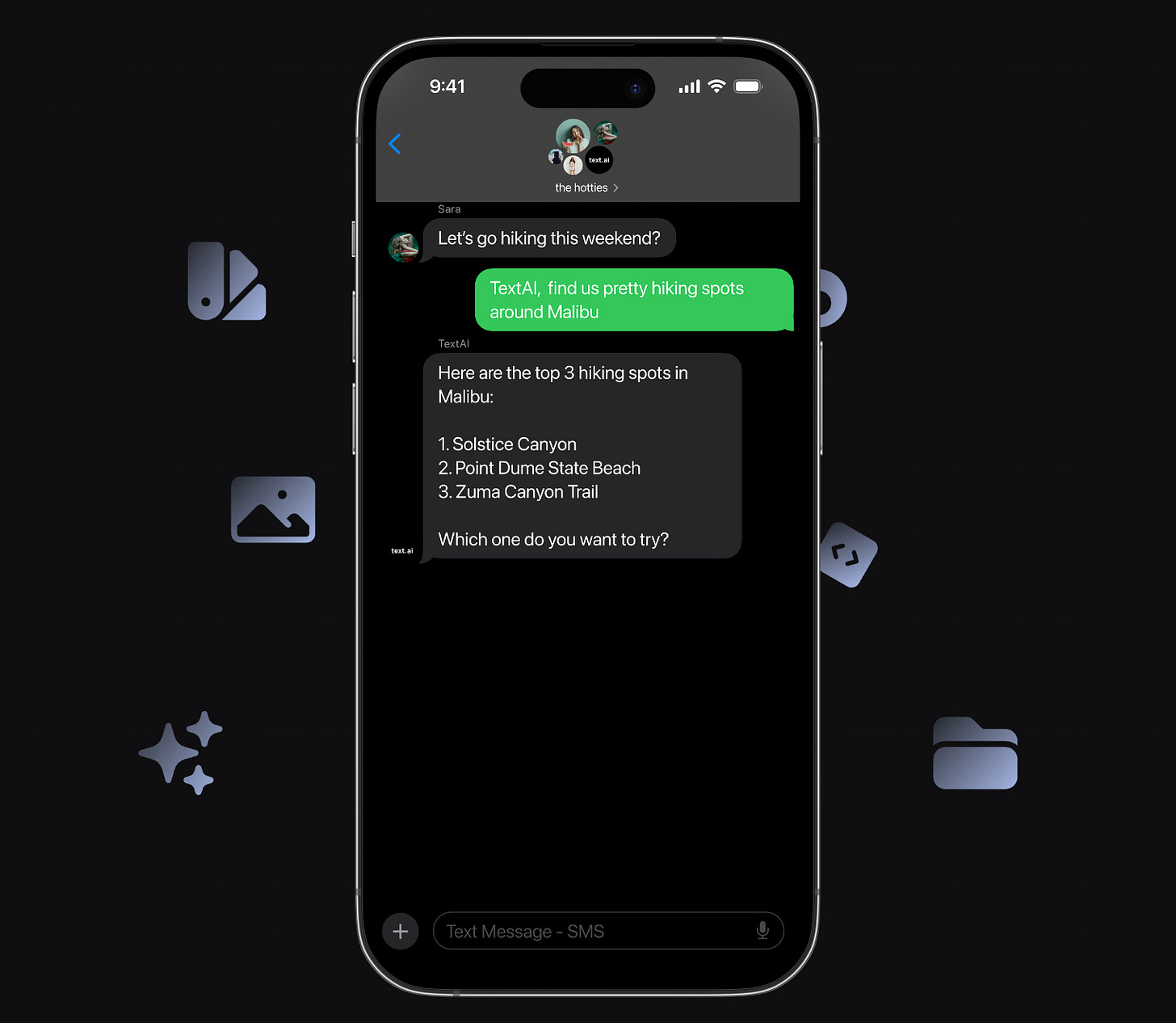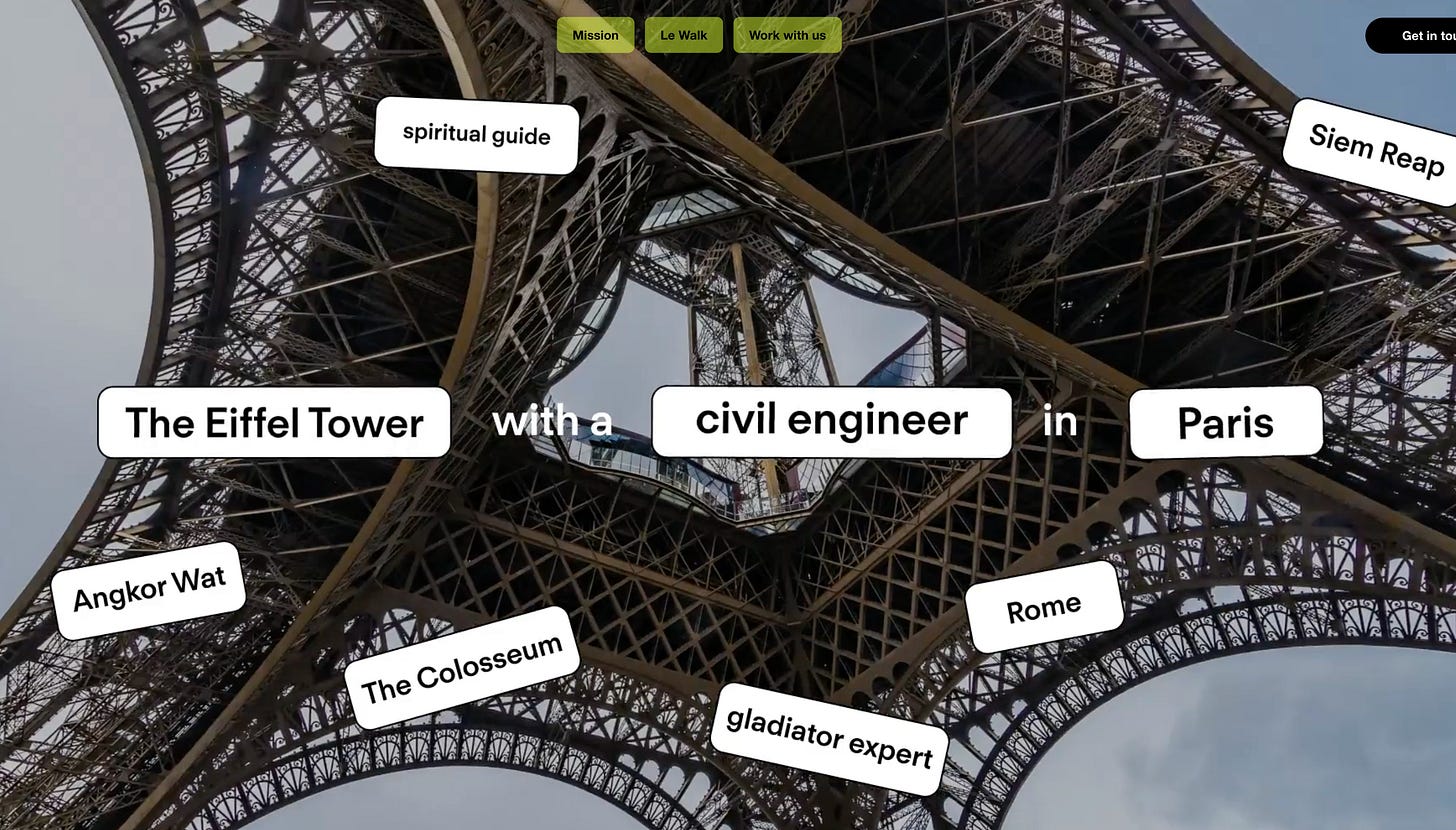20 Seed & Series A Companies Building in Consumer AI
A Snapshot of Innovation, from AI Shopping to Real-Time Avatars
Weekly writing about how technology and people intersect. By day, I’m building Daybreak to partner with early-stage founders. By night, I’m writing Digital Native about market trends and startup opportunities.
If you haven’t subscribed, join 70,000+ weekly readers by subscribing here:
20 Seed & Series A Companies Building in Consumer AI
Here’s a crazy stat: of the 100+ companies in the latest Y Combinator batch, only 4 (!) were building in consumer.
Yet the biggest tech companies of all time tend to be in consumer: Big Tech companies like Apple, Amazon, Alphabet / Google, and Meta / Facebook, sure, but also recent blockbuster IPOs like Uber, Airbnb, and DoorDash (all higher-valued than the biggest enterprise IPO of the last decade, Snowflake).
Just last month, Chime went public and boasts a $12B market cap. Back in 2016, when Chime desperately needed cash, over 100 VCs said no. The company almost went out of business. (Shoutout to Lauren Kolodny at Acrew, who led Chime’s $9M extension.)
Many consumer founders will resonate with Chime’s story: consumer startups often face a chilly reception from VCs, particularly in recent years.
One reason, in my mind: as VC has matured as an asset class, many firms have become less risk-taking, less bold. People forget that this is a power law industry predicated on outlier returns. Internal cultures at multi-stage firms often reward heat-chasing (“Did we see the deal?” “Did we beat a16z?”) over conviction. It’s easier to get promoted by winning a competitive deal than by doing an unpopular extension in a company like Chime, which might take years to prove its value. Consumer companies are also more volatile than enterprise companies, which follow more of a playbook.
There’s another reason that people soured on consumer: where we were in the cycle. As mobile became more saturated, fewer opportunities were left. We’re now at the beginning of a new cycle with AI, meaning a new application layer is just starting to form. This creates a fresh moment for consumer innovation, and you can feel the energy shifting in VC-land.
Last week, I went to San Francisco for the Humans in the Loop event, a celebration of consumer AI innovation that Forerunner put on with co-hosts like Sequoia, Thrive, USV, and us at Daybreak. A couple weeks back, I mentioned the event in The Opportunities in Consumer AI. I promised we’d do a run-down of how it went, and that’s the goal this week.
A good venture portfolio balances consumer and enterprise. So far this year, we’ve made six investments at Daybreak; four are in enterprise, two are in consumer. We typically target a 50/50 split, so we’re fairly on target.
But I wanted to write a couple pieces about consumer—last month’s deep-dive as a run-up to Humans in the Loop, and this week’s breakdown—simply because it’s been so under-appreciated, and because this moment represents such a seismic opportunity for consumer innovation. Being a VC who invests in consumer shouldn’t be contrarian, and the hope of everyone at Humans in the Loop was that the event would inspire more builders.
I think we achieved that. The energy at the event was palpable, with 1,000+ founders, builders, and investors crowding into the Presidio for a day full of fireside chats and demos.
For this week’s piece:
Quick recap of highlights from fireside chats, then
Snapshots of the 20 early-stage companies that presented.
Highlights
A few highlights from the conversations at the event:
➡️ I liked Alfred Lin’s parallel between mobile and cloud. Back during mobile, a worthwhile exercise was to break apart features of the iPhone, then predict which companies each feature could enable. His example: the GPS allowed couriers to drive around with Google Maps, delivering food. This led to DoorDash.
Other examples I can think of:
Camera: Instagram
GPS: Uber
Gyroscope: Strava
Push Notifications: Duolingo
Touchscreen: Tinder (swipe)
Now apply the same framework to AI. What capabilities exist in the new models, and what companies do they enable?
➡️ Reid Hoffman’s key point: traditional startup advantages still matter. Examples:
Network effects
First-mover advantage to scale
Brand establishment
Product superiority can still win in consumer. Exhibit A: ChatGPT vs. competitors.
➡️ Mike Krieger had a good vantage point in mobile, as the co-founder of Instagram. And now he has a good vantage point in AI, as Chief Product Officer at Anthropic.
Mike talked about how we’re in the age of everyone building with software, similar to last month’s The Personalization of Software. Mike said that he’d built an app for his wife that contained sounds of their cat. “It crushed on Valentine's Day.”
Now, you don't have to be technical to build products like that app. As one of Mike's non-technical friends put it: “Oh, so this is what you engineers have been feeling for years?” Anyone can build magical, delightful stuff now.
The 20 Companies That Presented
All 20 companies that presented were Seed or Series A stage, each nominated by one of the co-hosting firms.
There were some common themes that emerged:
AI + shopping: A few companies building in this intersection, from virtual try-ons to personal stylists to commerce infrastructure
AI companions: Various use cases here, from dating to health
Different “formats” of AI: real-time avatars, “clones” / digital minds of actual people, human-sounding generated voices
Here’s a quick note on each company:
1) Delphi
Delphi creates a new category: Digital Minds. You can chat with someone’s Digital Mind 24/7, asking questions, getting advice. Dara, Delphi’s co-founder and CEO, calls this “a digital Library of Alexandria.” His ambition is to preserve all of humans knowledge, while unlocking access to the world’s great minds.
I’ve written before about Delphi, and shared my Delphi. It works pretty well:
Not bad. Jess Lee at Sequoia, who just led Delphi’s Series A, suggested at the conference that I add my Delphi to the end of each Digital Native, so that people can ask questions and discuss the piece. I might start doing that.
2) Audos
Audos is an AI-powered startup studio that wants to launch 100,000 companies a year.
3) Particle
Particle is AI-powered news aggregation, billing itself as “an easier way to stay informed.” It sits #34 today in ‘Magazines & Newspapers’ in the App Store.
4) Contra
Contra is a professional network for AI jobs, helping you connect with independent workers.
5) Andromeda
Andromeda builds empathetic humanoid robots. Here’s Abi, who joined the founders on stage:
Abi is primarily used today for companionship for the elderly.
Abi can adapt to each senior’s personality, ability, and language—both building connections and enhancing care team capacity.
On a podcast I listened to this week, Vinod Khosla expected that in 10 years, we’ll all have a household humanoid robot. It might cook for us, and be contained to the kitchen. It might cost 300 or 400 bucks a month, sort of like leasing a car. I’m not sure if the timing there is right, but I agree that we’ll be talking about humanoid robots in the 2030s like we’re talking about ChatGPT, Cursor, and transformer models today.
6) SHOWRUNNER
Showrunner lets you generate animated shows and scenes. You can do text-to-video, creating a show in the style of—say—South Park. The team calls it “the Netflix of AI.”
7) New Generation
New Generation builds AI for brands, letting you integrate AI chat, agents, and so on into commerce. This is essentially the B2B play we talked about in the Agentic Commerce piece.
8) Text AI
Text AI is one of those four consumer companies in the YC batch. The product brings AI directly into your group chats, no downloads required. This image gives you a good sense of how you can use Text AI:
You can try it on SMS or WhatsApp today.
9) Onton
Onton is reinventing shopping search, letting you shop conversationally in home decor. For example, I can search, “I want a cream sectional sofa for my living room.”
I can also shop through dreamy AI-generated visuals, like this gorgeous living room, first designing the room and then buying the products in it.
10) Persona AI
Persona creates real-time, interactive avatars. Most avatars so far—think HeyGen, Synthesia—read a script for a use case like Learning & Development or Sales & Marketing. The future, of course, is avatars who can interact intelligently with humans. You can envision a wide range of use cases, from consumer (e.g., companionship) to enterprise (e.g., hiring / interviews).
Persona’s demo was one of the more stunning moments of the day, as the founders revealed to the avatar that she was live on stage. She was caught off guard, and more than a little upset to be put on the spot like that. Crazy stuff.
11) Daydream
Daydream is doing something similar to Onton, but in fashion. The company finally came out of beta last week after its $50M (!) Seed last year. You can now play around with it here.
12) Known
Known is an AI matchmaker, reinventing the dating industry. This is becoming a crowded category, but the opportunity seems large: people have massive dating app fatigue. Dating apps are single-player and lonely—wouldn’t it be nice to have, like, a little help? Cue the comparisons to Black Mirror’s “Hang the DJ” episode (one of my favorites).
13) PlayAI
PlayAI lets you generate AI voices that sound as real as human voices, then deploy them anywhere. News emerged this week that Meta is in talks to acquire PlayAI, part of its (expensive) vacuuming up of AI talent.
14) Digg
Digg is reborn as “the front page of the internet” and a hub for communities.
13) Routes AI
Routes gives you immersive audio experiences to let you tour the world’s great cities. As you walk around the Roman Forum, for instance, you can get a rich, geolocation-based audio tour of Rome’s history.
You can choose your own tour guide:
16) Arcade
Arcade lets you design any product with AI, then get it manufactured just for you. It’s sort of like Etsy if you could dream up anything and…just have it made.
The example in the demo was a Koi fish rug. Search it in Arcade, generate some options, then choose an artisan to craft it for you.
17) Callie
Callie gives you a self-care pet to help you with eating disorders. The product is quite clever while also being impactful, melding together consumer and healthcare.
18) SuperMe
SuperMe aims to displace LinkedIn, with a professional network for the AI age. This is bold: in my mind, LinkedIn has the strongest network effects of any social network. But SuperMe looks like it can siphon off some use cases, just as Happenstance (one of the AI products I use the most) has done with LinkedIn Sales Navigator.
19) Doji
Doji is a virtual try-on company, showing you what you’ll like in a wide range of (mostly luxury) clothes. You (1) create an AI likeness, (2) try on new looks, and (3) buy them. It doesn’t hurt that the app makes you look just a littttttle bit hotter too, which no doubt helps with viral sharing. I’ve loved playing around with Doji and seeing how I look in different fits.
There’s a clear why-now here, both on the technological side (diffusion models powering photorealism) and the cultural side (Gen Z self-expression). The virtual try-on is, of course, a wedge into actually buying stuff.
20) Rosebud AI
Rosebud lets you vibe code mobile games. The company says over 1M projects have been made.
See you after the holiday, when we’re back to regularly scheduled programming. Have a great 4th of July!
Thanks for reading! Subscribe here to receive Digital Native in your inbox each week:


